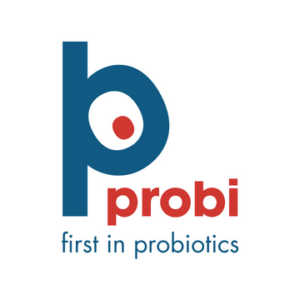Synbiotics by Probi and Clasado combines the most researched probiotic strains with the most comprehensively studied galactooligosaccharide (GOS) prebiotic available on the market. Bimuno® GOS is supported by over 110 publications, including 20+ clinical trials, while Probi Digestis® and Probi Defendum® boasts over 250 publications, including 80+ clinical trials. These synbiotic concepts represent truly scientifically backed combinations, offering either a unique and novel gut health position, or, an overall gut-immune concept.
- Synbiotics by Probi® and Clasado
Synbiotics by Probi® and Clasado
Overview
Scientific reference(s)
- Probi Digestis® Over 70 human clinical studies.
- Ducrotte, P., et al., (2012) Clinical trial: Lactobacillus plantarum 299v (DSM 9843) improves symptoms of irritable bowel syndrome. World J Gastroenterol. 18(30): p. 4012-8.
- Niedzielin, K., et al., (2001) A controlled, double-blind, randomized study on the efficacy of Lactobacillus plantarum 299v in patients with irritable bowel syndrome. Eur J Gastroenterol Hepatol. 13(10): p.1143-7.
- Nobaek, S., et al., (2000) Alteration of intestinal microflora is associated with reduction in abdominal bloating and pain in patients with irritable bowel syndrome. Am J Gastroenterol. 95(5): p. 1231-8.
- Krammer, H., et al., (2021) [Treatment of IBS with Lactobacillus plantarum 299v: Therapeutic success increases with length of treatment - real-life data of a non-interventional study in Germany]. Z Gastroenterol. 59(2): p. 125-134.
- Kujawa-Szewieczek A., et al., (2015) The Effect of Lactobacillus plantarum299v on the Incidence of Clostridium difficile Infection in High Risk Patients Treated with Antibiotics. Nutrients. 4;7(12):10179-88.
- Probi Defendum® Over 30 human clinical studies.
- Berggren, A., et al., (2011) Randomised, double-blind and placebo-controlled study using new probiotic lactobacilli for strengthening the body immune defence against viral infections. Eur J Nutr. 50(3): p. 203-10.
- Busch, R., et al., (2013) Randomized, double blind and placebo controlled study using a combination of two probiotic lactobacilli to alleviate symptoms and frequency of common cold. Food and Nutrition Sciences. 4: p. 13-20.
- Lazou Ahren, I., et al., (2020) Evaluation of the efficacy of Lactobacillus plantarum HEAL9 and Lactobacillus paracasei 8700:2 on aspects of common cold infections in children attending day care: a randomised, double-blind, placebo-controlled clinical study. Eur J Nutr. 59(1): p. 409-417.
- Ahren, I.L., et al., (2021) Fewer Community-Acquired Colds with Daily Consumption of Lactiplantibacillus plantarum HEAL9 and Lacticaseibacillus paracasei 8700:2. A Randomized, Placebo-Controlled Clinical Trial. J Nutr. 151(1): p. 214-222.
- Batu E.D., et al., (2022). Probiotic use in the prophylaxis of periodic fever, aphthous stomatitis, pharyngitis, and adenitis (PFAPA) syndrome: a retrospective cohort study. Rheumatology International, 42, 1207-1211.
- Bimuno GOS over 20 clinical trials
- Vulevic J., et al., (2018) Effect of a prebiotic galactooligosaccharide mixture (B-GOS®) on gastrointestinal symptoms in adults selected from a general population who suffer with bloating, abdominal pain, or flatulence. Neurogastroenterol Motil. 30(11):e13440.
- Parker C., et al., (2023) Effects of 24-week prebiotic intervention on self-reported upper respiratory symptoms, gastrointestinal symptoms, and markers of immunity in elite rugby union players. European Journal of Sport Science. 10.1080
- Mack, D.R., et al., (1999) Probiotics inhibit enteropathogenic E. coli adherence in vitro by inducing intestinal mucin gene expression. Am J Physiol 276(4): p. G941-50.
- Mack, D.R., et al., (2003) Extracellular MUC3 mucin secretion follows adherence of Lactobacillus strains to intestinal epithelial cells in vitro. Gut, 2003. 52(6): p. 827-33.
- Adlerberth, I., et al., (1996) A mannose-specific adherence mechanism in Lactobacillus plantarum conferring binding to the human colonic cell line HT-29. Appl Environ Microbiol. 62(7): p. 2244-51.
- Hütt P., et., (2006) Antagonistic activity of probiotic lactobacilli and bifidobacteria against entero- and uropathogens. J Appl Microbiol 100: 1324-1332.
- Lavasani S., et al., (2010) A novel probiotic mixture exerts a therapeutic effect on experimental autoimmune encephalomyelitis mediated by IL-10 producing regulatory T cells. PLoS One 5: e9009.
- Humphreys, G. J., & McBain, A. J. (2019). Antagonistic effects of Streptococcus and Lactobacillus probiotics in pharyngeal biofilms. Letters in applied microbiology, 68(4), 303–312.
Additional info
Therapeutical area(s)
Gastrointestinal tract · Immune system
Functionality
Constipation · IBS · Immune stimulation
Age/Gender
Adults · Children · Elderly
Dosage form
sachets, sticks
CFU/Dose
10 billion(s)


